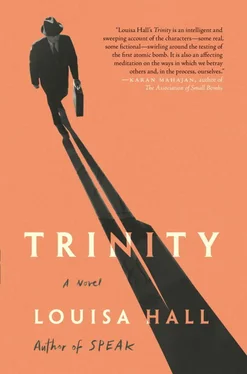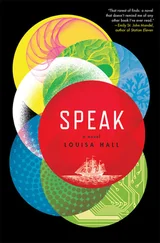He told me about a talk he gave at a school called Sudbury once, on the subject of responsibility and privilege, and he told me about a secretary he had in Princeton, who gave him a blank sampler her sister embroidered.
He told me about a house he’d loved once, on Shasta Road. He told me he’d often listened to Bach in difficult moments. He told me it was Jean who introduced him to the metaphysical poets, and that the last time he’d seen her, they’d danced at the Xochimilco Café.
He said he’d begun collecting rocks when he was a child and his father took him back to Germany, where he met his grandfather for the first and only time in his life.
He told me that his mother could have been a great painter, but she’d gotten married. He told me that he’d really believed it was the right thing to do to go back and see Jean, though six months later she drowned herself in the bathtub. And he told me that even despite everything he’d learned about the dreadful politics of the thing, the fact that it might have done nothing to speed up the end of the war, and the new facts revealed every day about the extent of the suffering they caused in Japan, he didn’t regret building the bomb, because he felt it was a scientist’s duty to know, and he’d acted as a scientist.
And I listened to him while he spoke, attempting to assemble himself once again, trying to describe himself in a way that would cohere, and when the interview had concluded, I stood and shook his hand and moved to the door, and as I crossed the room, I saw a pack of cigarettes underfoot.
I looked down at them for a moment. Somehow I’d missed them on my way in. I’d imagined I’d seen everything in that clean, oddly bare office. But I’d missed that open pack.
It was a strange piece of evidence, because Oppenheimer had only smoked pipes since he learned that he was dying of cancer. But there it was, its top tilted open, revealing the foil and a few loose cigarettes falling out.
Stiffly, as if I’d been sitting longer than I really had, I leaned over and picked them up, and by the time I’d stood again, Oppenheimer was already there by my side, offering me his silver lighter.
How seamlessly, in that single gesture, he slipped again into the charm of his youth.
With such practiced style, he gave the kaleidoscope a quick turn. With the same elegance that was his when those women congregated around him in the living room of my parents’ house, he offered me that silver lighter, holding it before him like a torch, like an invaluable clue, a discovery I’d nearly missed.
Here I am, he seemed to be saying. Remember me: a boy who learned to ride over the mountains.
Who came home to his parents, who later went west again and felt free, who loved a girl and didn’t save her, who noted the sky, who noted the mountains, who did harm he never intended and didn’t ever forgive himself simply.
I am he, Oppenheimer seemed to be saying. A scientist. A man who helps his wife into her coat. A man who will always swoop in with his lighter.
THOUGH I DON’T SMOKE, I LET HIM LIGHT THE CIGARETTE.
I thanked him, and when I left his new office, the cigarette was still lighted. I walked with it down the empty staircase, along the empty front hall, and out the front doors of the new institute building. I only stubbed it out when I’d reached the sidewalk.
Then, standing alone, in my thin coat, I looked down at the smudge of ash on the concrete and thought about that bee I killed, and the article I’d have to write.
I felt strangely rooted in place, staring down at that smudge of ash, wondering about how I’d ever get started. Where could I begin, I thought, in telling the story of such a man’s life? Looking down at that glistening smudge, I thought of the anecdotes he’d relied on: the secretary with her blank sampler; the Berkeley friend he’d seen in Paris; the song he and Jean danced to at the Xochimilco Café. What could they tell me, I wondered, about such a man? How could they help me to know him?
Lost in such thoughts, I had to tear myself away and force myself to move toward the station, and as I walked away from campus, past the street where I grew up, where my mother never explained to me why she stayed with my father, or what she left behind when she came here, I thought that perhaps it’s only in those moments between the slides of the kaleidoscope, those moments of a life that never crystallize into practiced anecdote or reliable knowledge, that we close our eyes and people pass through us, or over us and around us, as a wave sweeps us off our feet and makes us another part of its motion.
Then, I thought, in that moment of unknowing, there’s no difference between us. And I thought again about that bee I’d crushed in the weeks after that woman called me, and the love I’d felt for it after, when it was dragging itself in circles, both of us stunned by the violence that had escalated so abruptly. I thought about my husband, and the love I’d felt for him when he sat on the rug with our son, looking up at me with that lost expression, befuddled by the unhappiness he’d set into motion. I thought about my father, stung by the stupidity of his own joke, and my mother, with her frozen face, playing the piano while we watched from the landing, all of us caught up in that wave of cruelty we couldn’t quite grasp, all of us swept off our feet and tumbled over by that force so much larger than any one of us could be: trying, in that tumult, to find something solid to keep, a person to know, a rock to hold on to.
And then I thought again of those women in the photograph of Hiroshima, their faces bandaged, their eyes holes in the white cloth, moving through the charred rubble.
I thought of those women who, in the days after the bombings, seemed to be scouring the ruins, looking for some artifact of their former lives, which—in one instant after that single plane passed over a sky described by everyone who survived as irreproachably, perfectly blue—had been so thoroughly and absolutely demolished.
Walking back toward the train, in that strange and wavering light, I thought about what I didn’t know of those women in that photograph.
They’d lost so much more than I’d ever lost, searching in the rubble that was the result of one plane crossing a clear blue sky and a single flash of white light, obliterating their city in an inexplicable instant, so that later, in the wake of that instantaneous and total destruction, they were left to search the rubble for some piece of proof that their former lives had ever existed.
Or that’s what I imagined. Maybe, I thought, though I’d never know, they were searching for some little thing—an old scrap of fabric, a rock, a page torn from a book—something that could be held, something that could be felt as evidence of those days before the destruction, days that passed in relative peace, searching for something solid to hold so they wouldn’t be forced to carry the entirety of the world as it once was—the seasons as they’d once developed, the trees as they’d come to leaf, the people they’d fallen in love with under the canopies of those branches—inside their own minds, a world purely imagined, the real world having flashed white and then tilted and passed thinly shuddering through them.
I am beyond grateful to Megan Lynch, Susanna Lea, and Kerry Glencorse, for guiding this book through every stage of existence; to Emma Dries, Ashley Garland, and everyone at Ecco, as well as Mark Kessler and everyone at Susanna Lea Associates, for all their support; and to Marie-Pierre Gracedieu at Gallimard, for helping me understand what it was I was writing.
Thanks also to everyone at Yaddo, Macdowell, and La Maison de la Poésie, for precious time to finish this; and to the nonfiction writers—especially Kai Bird and Martin J. Sherwin, Michihiko Hachiya, M.D., John Hershey, A. C. Grayling, and the contributors to Women of Wartime Los Alamos—whose research and testimony provided the backbone of this novel.
Читать дальше












